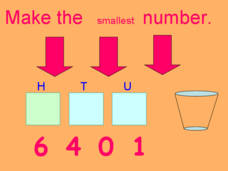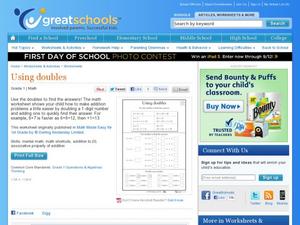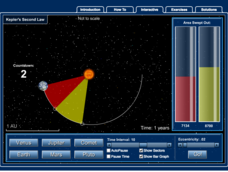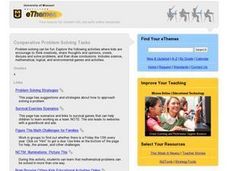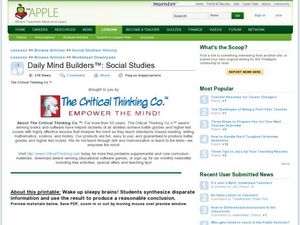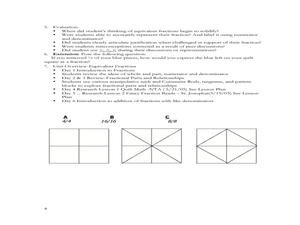Curated OER
Math computation
The lesson says it is intended for 4th grade but it is suitable for grades 1-3 as well. The class discusses what it means to add, the commutative property of addition, and mathematical reasoning. This is an exercise in number sense,...
EngageNY
Mid-Module Assessment Task: Grade 8 Module 7
Assess pupil understanding of rational and irrational numbers with a mid-module assessment that is the 15th lesson in the 25-part series. The questions represent the objectives in the first half of the series. Topics include decimal...
Curated OER
Environmental Agents of Mathematics: Mathematics for Change
High schoolers analyze environmental science data using Math. They do research about renewable energy, gather data, create graphs and interpret their findings. Then the group presents their arguments persuasively using their findings to...
Curated OER
Make the Biggest Number
Each slide gives learners four numbers to use. They order the numbers into three boxes, in attempts at making the biggest number. This age-old place value game is fun, easy to play, and now ready to use in slide-show format.
Curated OER
Place Value Challege: Make the smallest number
Challenge your class with this place value activity. There are ten sets of four numbers, and they use three number from each set, to construct the smallest number possible. This is a great game to play prior to introducing decimals and...
Under the Dome
Card House
Mathematics is stronger than a card house. Pupils watch a video of the beginning of the building of a triangular card house. Scholars come up with questions they wonder about from the video and ask for more information to arrive at an...
Curated OER
Number Line: Negative Numbers
In this graphing calculator activity for the TI-83 calculator, middle schoolers first observe a demonstration for calculating negative numbers. Next, middle schoolers use their graphing calculator to answer 6 thoughtful T/F and short...
Curated OER
Factor Pairs
This presentation covers a lot of ground. Square numbers, metal math computations, commutative property, ordering positive and negative integers, factoring, and real world problem solving are all covered. Use over the course of several...
Curated OER
Using Doubles
Bring this easy shortcut to your first grade addition lesson! By adding doubles (6+6, for example), and then adding or subtracting 1, kids learn how to solve simple addition problems with ease. This trick is especially helpful for...
Pixle
Foldify
Creating with an app is nice. But, creating with an app and being able to print and use your creation is great! This tool provides the opportunity to hone the skills related to spacial awareness, three-dimensional thinking, creativity,...
McGraw Hill
Kepler's Second Law Interactive
Kepler decided to think outside the box and discovered that planets orbit in elliptical patterns. An engaging activity demonstrates the elliptical orbit pattern in relationship to the area of a planet to explain Kepler's Second Law....
Concord Consortium
Hockey Pucks
Package design is a mathematical task for any business. Young scholars use a package design to determine the number of packages required for specific shipments. Using ratios, proportions, and fractions, they make decisions about the best...
Curated OER
Best lesson in the whole world!
Students study the concept of fraction using mathematical reasoning. In this problem solving fraction lesson, students use various methods to explain their reasoning in solving fractions. Students use a number of different prompts to...
Curated OER
Cooperative Problem Solving Tasks
Fourth graders explore the following activities where kids are encourage to think creatively, share thoughts and opinions, create, discuss and solve problems, and than draw conclusions.
Curated OER
Number and Operations- Using Gift Certificates
Students apply number and operation skills to learn how to spend a gift certificate. In this mathematical reasoning lesson, students use base 10 blocks as money and calculate how much money they have.
Curated OER
Probability and Statistics
Students reason mathematically as they solve problems dealing with probability of an even occurring. In this probability activity, students differentiate between different rankings of candidates running for leadership. They identify...
Curated OER
Daily Mind Builders: Social Studies
In this critical thinking activity, 5th graders create a conclusion. Students read a short passage and use the given information to synthesize their own conclusion from the presented material.
Curated OER
Math Club #7: Logic
In this logic worksheet, 8th graders work in groups to solve 8 math problems requiring critcial thinking skills.
Curated OER
New York State Testing: Grade 4 Mathematics
In this NY state grade 4 math test activity, 4th graders complete a total of 39 problems that cover a wide variety of grade 4 math concepts.
Curated OER
Applied Science - Science and Math Pre - Lab (Scientific Method)
Students examine science. In this scientific method lesson, students are introduced to what every experiment contains (hypothesis, critical thinking) and how an experiment is conducted. They watch a demonstration and then work...
Curated OER
Patterns
Students explore simple patterns. In this mathematical thinking geometry lesson, students repeat clapping and snapping patterns, and determine what comes next in sound and movement patterns. Students recite "Hey, Diddle,...
Curated OER
Half Math Quilt
Help your third graders become familiar with equivalent fractions for one-half by having them create a quilt. They will use triangles to create a quilt of equivalent fractions over a period of 6 days. As they create the quilt pieces they...
Texas Instruments
TI-Nspire™ CAS
When it comes to rating educational calculators, this calculator is always near the top of this list. Now it's available as an app. There is a lot of calculator power wrapped up in this app. Not only is this a fully functioning...
Illustrative Mathematics
Fractions and Rectangles
Visual models are excellent teaching tools when explaining equivalent fractions. Looking at a rectangle cut into twelfths, young scholars first identify the shaded fraction, and then explain whether the fraction is equal to one-fourth....






